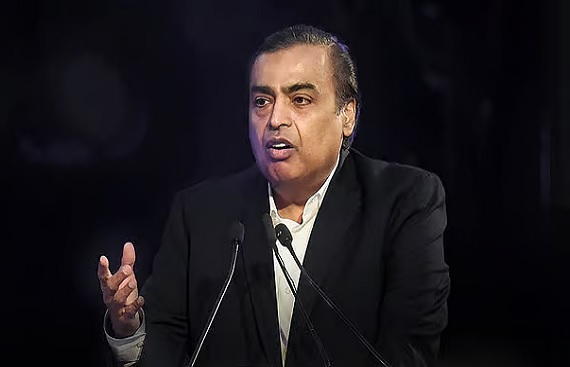Mukesh Ambani Says Jio Was a Make or Break Moment That Paid Off for India
By
siliconindia | Wednesday, 25 June 2025, 08:48 Hrs

- Ambani calls Jio his biggest risk, taken to digitally transform India despite financial uncertainty.
- Jio revolutionized telecom, offering cheap data and free calls, boosting internet access for millions.
- Reliance aims for lasting impact, focusing on future technologies, institutional values, and national growth.
In a candid conversation with global consulting firm McKinsey & Co., Reliance Industries Chairman and Managing Director Mukesh Ambani described his bold return to the telecom sector in 2016 through Reliance Jio as the 'biggest risk' of his career. Despite warnings from analysts about possible financial failure, Ambani asserted that the bet was worthwhile for its monumental role in digitising India.
"When we started Jio, it was our own billions of dollars being invested to build a 4G network, at a time when many believed India was not ready for such an advanced digital infrastructure", said Ambani. “But I told my board even if we don’t earn returns, this will be our best act of philanthropy because we will have digitally transformed India”.
Since its inception in 2016, Jio has rewritten the rules of the Indian telecom landscape. With free voice calls and drastically reduced data costs, Jio sparked a digital revolution that compelled competitors to cut prices and ramp up services. The move accelerated digital adoption across the country, especially in rural and low-income regions.
Prior to Jio’s market entry, mobile internet in India was relatively expensive and largely inaccessible to vast sections of the population. Jio's aggressive pricing strategy ignited a price war that made mobile data affordable for millions. As a result, internet penetration soared, and India today boasts over 800 million internet users one of the largest online populations globally.
This surge in digital connectivity has bridged the digital divide, bringing first-time internet users online and accelerating the growth of sectors like e-commerce, fintech, online education, and digital entertainment.
“We’ve always taken big risks, because scale matters to us”, Ambani said. “Jio was our biggest risk yet. Some analysts said it might not be financially viable. But we were willing to take that chance because it was our own money, and I believed in the vision”.
Today, Reliance Jio stands as India’s largest telecom operator, with over 470 million subscribers and a growing presence in emerging sectors such as 5G, cloud computing, and artificial intelligence.
Ambani also reflected on his long-term vision and commitment to building enduring institutions. “We come into this world with nothing and leave with nothing. What we leave behind is what truly matters. My father, Dhirubhai Ambani, told me that Reliance must be an institution that lasts beyond us. That’s been my promise to him to build something that endures”, he shared.
Looking ahead, Ambani envisions Reliance celebrating not just its 50th anniversary in 2027 but continuing to serve India and the world even beyond its 100-year mark. “The Reliance of today is not the same as the Reliance of the ’60s or the 2000s. The world changes every five or ten years, and we’ve evolved with it”, he said.
Ambani acknowledged that Reliance has often gone against conventional business wisdom such as integrating across the value chain or chasing unproven technological ventures but maintained that the pursuit of future opportunities often necessitates such bold moves.
“Our institutional culture is what anchors us. It’s our best insurance against risk”, he added.
On managing risk, Ambani explained that his core principle is to always evaluate whether the organisation can survive the worst-case scenario. “If you can survive the worst, then you’re in a good place to take bold decisions”, he noted.
He also spoke about his leadership principles, revealing a deeply human approach to management. “About 30 to 40 years ago, I decided I should always be able to look my employees in the eye. At Reliance, we encourage our leaders to maintain eye contact it reflects sincerity and accountability”, he said.
“This idea that whatever we do, we should never be embarrassed to look each other in the eye is a simple yet powerful cornerstone of our culture”, he explained.
This emphasis on transparency, values, and long-term vision has been key to shaping Reliance Industries into one of India’s most formidable business institutions. Under Ambani’s leadership, Reliance has transformed from a petrochemical and textile giant into a diversified conglomerate with leading roles in telecom, retail, digital services, and renewable energy.
As Ambani concluded, “Our mindset has always been to believe in the future. And when that future is digital, inclusive, and transformative, the risks are always worth taking”.
